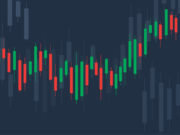Right now, we’re not experiencing what you’d call a broad market sell-off, but the market’s future remains uncertain, as we can agree that it’s certainly been a wild year on Wall Street. There are concerns:
❖ High, seemingly increasing inflation
❖ Geopolitical conflicts
❖ Increased cost of living
❖ A potential 2024 recession
If there was ever a good time to trim some unnecessary fat from your portfolio, this may as well be it.
Despite the unpredictability, we should be prepared for a turbulent near-term stock market, and lowering exposure to debt-ridden, volatile stocks is a prudent step…
Lucid Group Inc (LCID)
Perhaps a little more deceptive than the others on this list, or at least misguided, is Lucid Group Inc. (LCID), which has a market capitalization and public attention akin to Rivian Automotive (RIVN). However, rather than becoming a formidable Tesla (TSLA) competitor, RIVN looks like it’s headed for an unfortunate downfall. Investors are well aware of LCID’s letdown, hence the decline of its trading price, no longer being seen as a “Tesla killer” and dangerously close to penny stock status. While some argue for LCID’s potential in tech licensing, given the sales declines, significant cash burn, and ongoing price depreciation, it’s probably wise to steer clear. I’ll highlight a few of LCID’s downsides.
LCID is down year-to-date by 22.04% and has a 1.69 beta score (anything over 1 indicates vulnerability). With an ROE (return on equity) of –78.61%, LCID has a disproportionately high P/S (price to sales) ratio of 12.59x. For Q2 2023’s earnings call, LCID reported an EPS of –$0.42 per share vs. –$0.33 per share as expected by analysts, a –28.55% defeat, and it lost to analysts’ revenue estimates by a –26.41% margin. During the same period, LCID showed negative year-over-year growth in net income (-246.71%), EPS (-21.21%), and net profit margin (-123.68%). With a 10-day average trading volume of 25.3 million shares, LCID has a median price target of $7.25, with a high of $10 and a low of $5.
[stock_market_widget type=”accordion” template=”extended” color=”#5679FF” assets=”LCID” start_expanded=”true” display_currency_symbol=”true” api=”yf”]
AMC Entertainment Holdings (AMC)
AMC Entertainment (AMC) has lost its once-renowned “meme king” status, experiencing a significant share decline since August. Despite hopes for stabilization, the ongoing trend suggests that further sharp price drops for AMC could be on the horizon. The recent sell-off is primarily attributed to AMC’s substantial shareholder dilution strategy. Unfortunately for AMC, CEO Adam Aron’s attempts to present this as a positive move have not convinced investors. With the persistent issue of cash burn at AMC, which I’ll highlight next, the probability of more problems remains high, making this stock one to avoid.
AMC is currently down year-to-date by 77.95%, trading at the very bottom of its existing 52-week range. With a 2.02 beta score, AMC has a stunningly backward ROE of –1,913.03%, a negative free cash flow of –$460 million, and perhaps most surprising, a total of $9.5 billion in debt, which is more than $8 billion
higher than its market capitalization. AMC shows negative quarterly EPS growth (-202.35%) and revenue growth (-20.85%). With a 10-day average trading volume of 26.09 million shares, AMC has a median price target of $7.38, with a high of $45 and a low of $4.41; this suggests a 7% decrease from its current price.
[stock_market_widget type=”accordion” template=”extended” color=”#5679FF” assets=”AMC” start_expanded=”true” display_currency_symbol=”true” api=”yf”]
Hudson Pacific Properties Inc (HPP)
Particularly among REITs (real estate investment trusts), Hudson Pacific Properties (HPP) has found itself in a precarious position. The ongoing work-from-home trend continues to impact HPP’s office portfolio, and Hollywood union strikes present significant financial challenges for its sound stages and film and TV production facilities. Despite a temporary climb in shares, HPP’s stock is again declining, triggered by the decision to halt dividend payments. Even if the Hollywood strikes were to end soon, other concerns, such as HPP’s growing debt and increasing interest expenses, pose substantial risks. Considering these factors and that it no longer offers a dividend, HPP is a stock that should be dumped.
HPP is down year-to-date by 30.65%, has a 1.16 beta score, a negative ROE, a TTM (trailing twelve-month) momentum growth figure of –33.60%, and a D/E (debt to equity) measure of 141.12%. HPP currently holds shy of $5 billion in debt, more than five times higher than its $950 million market capitalization. For Q2 2023, HPP reported negative year-over-year growth in revenue (-3.46%), net income (-1,483.99%), EPS (-420%), net profit margin (-1,550%), and operating income (-55.32%). Scheduled to report Q3 earnings on November 2nd, HPP is projected to post $239 million in sales at –$0.20 per share. With a 10-day average volume of 4.75 million shares, HPP has a median price target of $6.50, with a high of $11 and a low of $4; this implies a price drop of almost 4% from where it currently trades.
[stock_market_widget type=”accordion” template=”extended” color=”#5679FF” assets=”HPP” start_expanded=”true” display_currency_symbol=”true” api=”yf”]











